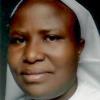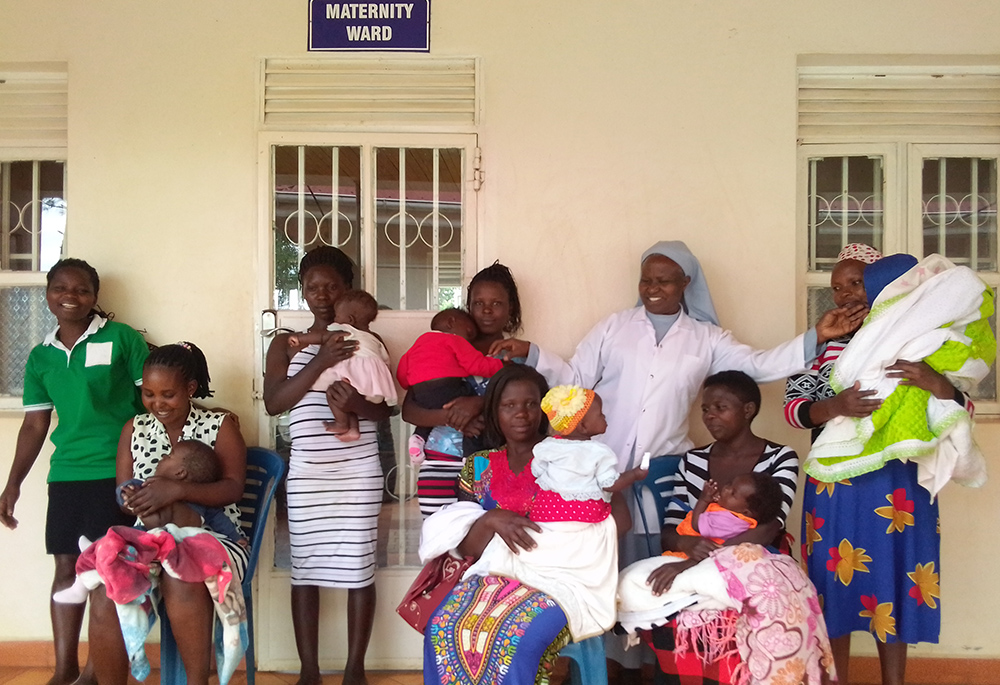
Sr. Jane Frances Kabagaaju is pictured with some of the patients served by the Nkuruba Health Centre. The center received a $25,000 grant as the award for her completion and successful presentation as part of the Builders of Africa’s Future award. The money will be used to address maternal health and newborn babies. (Courtesy of Sr. Jane Frances Kabagaaju)
Editor's note: Three Catholic sisters were among 11 entrepreneurs recognized with a Builders of Africa's Future award in 2022 by the African Diaspora Network. Each 2022 awardee presented their programs and received a $25,000 grant from the U.S. African Development Foundation. Each sister wrote a column about their experiences, which are collected below.

Sr. Jane Frances Kabagaaju is a member of the Daughters of the Child Jesus of Uganda and manager of the Nkuruba Health Centre in the rural Rwenzori region of Uganda, a mountainous region bordering the Democratic Republic of Congo. She has 23 years of experience as a nurse and clinical officer, and has served in various management roles at hospitals and rural health centers in Uganda. She has served as chairperson of
I am an excited social entrepreneur from Uganda, having received a Builder of Africa's Future award in 2022.
The invitation to participate in the program came through the Association of Consecrated Women in Eastern and Central Africa, or ACWECA, to the congregation of Daughters of St. Therese of the Child Jesus, whose headquarters are in Uganda.
I was among 11 sisters from different countries in Africa engaged in a course of study called "Start Your Social Enterprise." Being part of the program with other sister entrepreneurs was challenging and delightful as we learned new skills and understanding of social enterprise.
We put into practice other aspects of what we were learning. I chose an enterprise to address the United Nations sustainable development goal No. 3 — Good Health and Well-Being — because I was managing a health center. The goal seeks to address the complexities and inequities of access to health care that can lead to well-being.
After our training at the African Management Institute, Builders of African Future, or BAF, chose three sisters who had designed enterprises that would make a significant impact in their communities. We were joined by nine other entrepreneurs to form a cohort of 11 for 2022.
Before being selected as a Builder of Africa's Future awardee, I underwent three months of online training at the African Management Institute offered through the Africa Diaspora Network as a prerequisite.
Our training included bookkeeping, financial analysis, key drivers of business growth, how to build a team, and to assess innovation and growth opportunities, strategic planning, tracking methods for finances and supplies, managing debtors and raising capital. The tracking methods were so helpful — in two months we were able to recover more than $120 from debtors and we shall continue with this tracking method. I also learned how seasons impact our need for supplies and thus the importance of future planning. We did online examinations and received certificates.
As BAF awardees, we were also provided three mentors during this course who accompanied us up to the time of pitching our enterprise to different investors and donors. It was my first time to do the pitching; I did several practices with my fellow sisters to make sure I took only the required three minutes. I will use these pitching skills with donors/investors in the future.
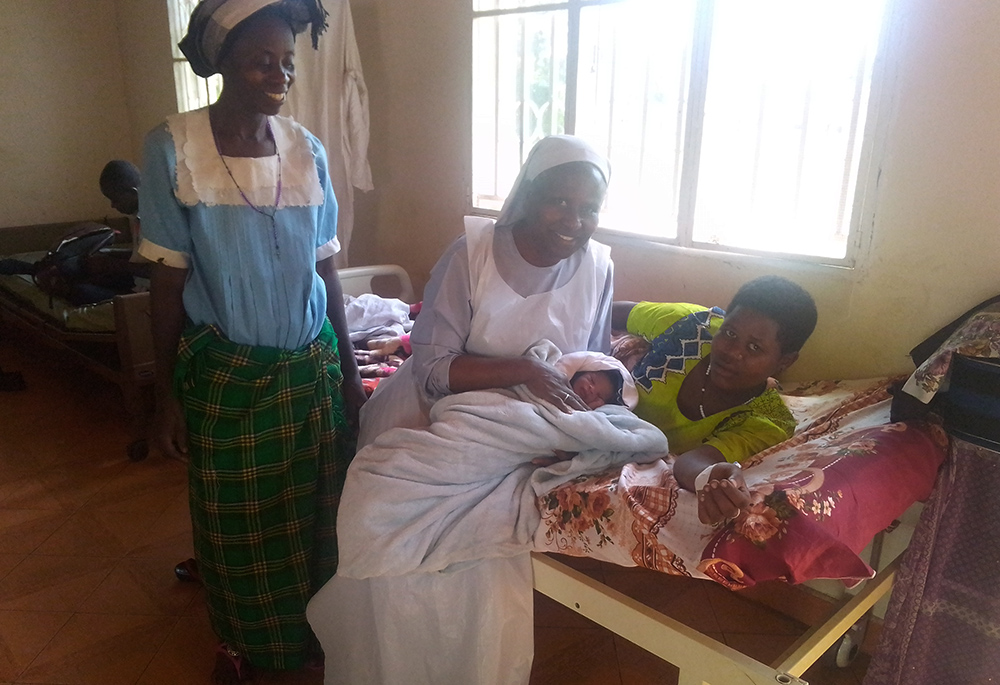
Sr. Jane Frances Kabagaaju is pictured with a patient after the successful delivery of a baby. Kabagaaju is the manager of the Nkuruba Health Centre in the rural Rwenzori region of Uganda, a mountainous region bordering the Democratic Republic of Congo. She was one of three Catholic sisters recognized with a Builders of Africa's Future award in 2022. (Courtesy of Sr. Jane Frances Kabagaaju)
With the award came a grant of $25,000, which we will use to address maternal health and newborn babies. Malaria, water-related illnesses, diarrhea and worms are common among adults and children, keeping maternal and child health extremely at risk. Our plan to address these issues is to make care accessible and affordable to increase the well-being of the entire community.
With the award, we will also now be able to provide 24/7 quality ultrasound scanning and equipment for emergency obstetric care and delivery by highly specialized and competent personnel. Another benefit of the award is that Nkuruba Health Centre is now registered in the U.S. federal government system for award management. This will give us leverage in seeking funding to enhance our ministry to our people.
My project, Nkuruba Health Centre, will now become a pilot and model of reducing maternal and child morbidity and mortality. The training gave us basics in finances, medical drugs and sundries, and human management, the key pillars in the health facility. This will help us to operate in an efficient and effective way that can lead us to quality service.
The health center is in the Rwenzori region of Uganda, a mountainous region bordering the Democratic Republic of Congo. The majority of families here live below the poverty line and depend on subsistence farming for survival. Besides food security, the region also suffers from insecurity along the border of DRC.
Nkuruba Health Centre has an estimated service area of about 96,700 people. In the financial year from July 2021 to June 2022, the center had a total number of 3,678 outpatients and inpatients, 733 prenatal mothers, 266 deliveries and 668 HIV/AIDS patients who are in active care and treatment, and 380 immunizations. Our staff is small — 15 workers including nurses, two midwives and other staff — and three other sisters and me.
I am so grateful to African Diaspora Network in partnership with the United States African Development Foundation, the Conrad N. Hilton Foundation and the African Management Institute of Kenya for their commitment to encouraging and assisting new entrepreneurs of Africa. The award will be helpful as we continue to face the many challenges in rural health care in African countries.
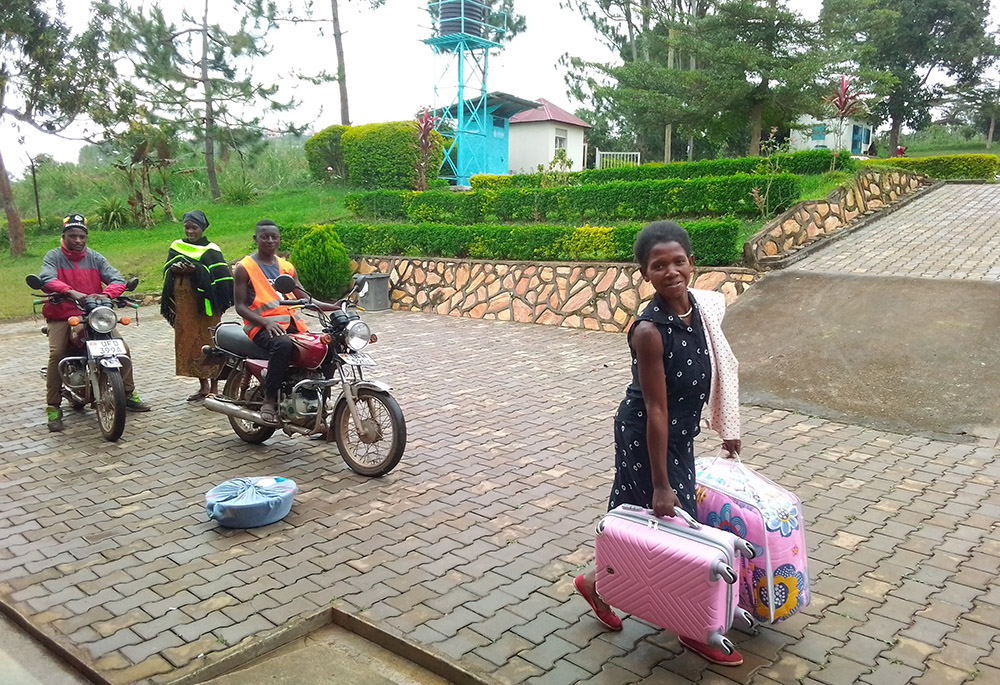
Some pregnant women use a local form of motorcycle taxi, known as boda boda, for transportation, which can be risky, Sr. Jane Frances Kabagaaju notes. The Nkuruba Health Centre is seeking to be a pilot and model of reducing maternal and child morbidity and mortality. (Courtesy of Sr. Jane Frances Kabagaaju)

Sr. Christabel Juunza Mwangani, a Religious Sister of the Holy Spirit, is based in the Diocese of Monze, in Zambia, Africa. She has been a sister for 19 years. Sister Juunza is one of the founding members of the Emerging Farmers Initiative, while serving as the congregation's councilor for finances, projects manager, and executive secretary for the Sisters Blended Value Project. She also serves as senior hospital administrator at Monze Mission Hospital as her full-time apostolate.
As Religious Sisters of the Holy Spirit, we have embraced the message behind the Sisters Blended Value Project to revive our ministries as well as to improve the financial status of the institute to sustain the sisters' life in the congregation. This entails that the ministries we are involved in reflect our charism and identity, have a positive impact on the community we serve by offering a solution to a problem they are facing, sustain the sisters financially and protect Mother Earth. There are currently 40 sisters in the congregation.
In order to achieve this, we were called to turn our ministries from charities to social enterprises. However, sisters did not have enough skills to run the ministries as social enterprises, so they needed some training in business strategies.
With this realization, a team of three sisters (Sr. Edna Himoonde, Sr. Purity Siloka, and myself) enrolled with the Miller Center for Social Entrepreneurship, for an orientation program in March 2019 in Nairobi, and in an accelerator program to prepare us and our projects for investment readiness from May to December 2020. At this time, a fourth sister was added to the team, Sr. Christerbel Mwaaba. This training helped me change the mindset from thinking that a "faith-based" organization should never charge its clients and give services for free, to realizing that every organization needs to be sustainable, so it is not wrong to attach a charge to a service rendered in order to spread the service to the underserved populations of a particular community.
Having clarified this, the Miller Center for Social Entrepreneurship helped us write our business plan with enough detail, while setting up our pilot projects in order to put into practice what we learned in the accelerator program. I looked forward to the weekly sessions with the mentors assigned to us by the Miller Center. By the end of the eight-month program, I was very clear with our business plan and was ready to pitch to any investor who was ready to listen.
While undergoing training with the Miller Center, my team and I founded the Emerging Farmers Initiative, or EFI, in 2019, with the permission of the congregational leadership. Our congregation has 40 sisters and is based in the Diocese of Monze, in the southern province of Zambia.
The Emerging Farmers Initiative is in Mulando village in the Nziba, Magoye area, in the same district as the motherhouse of the congregation. Nziba is in the rural part of Mazabuka District about 151 kilometers (about 94 miles) from Lusaka, the capital city of Zambia in the southern province. There are about 73 households in Mulando village with an average of eight members in each. The main trade is subsistence farming, cattle rearing and crop production. Due to frequent droughts and total dependence on farming, the levels of poverty are still high. The illiteracy level is also still high, estimated at 25%. Half of the population in the area is under 20 years of age.
The Emerging Farmers Initiative is meant to run in the context of a secondary school, as a production unit. Most schools focus only on academic learning. Through the Emerging Farmers Initiative — which houses our poultry, swine and egg production units; vegetable garden; fruit tree orchard; maize field and fishponds — we will offer hands-on training to our pupils and life-transforming skills to young school dropouts and young families at risk. We have had two beneficiaries of the program undergo training who are now employed by the Emerging Farmers Initiative, and we also have hired a general agriculturalist to manage the EFI and help with training. Starting in January, we will train school dropouts in cohorts of 15 every six months, translating to 30 per year. In the EFI, we will prepare our students to face the real world and succeed in life while raising consciousness on preserving and replenishing Mother Earth.
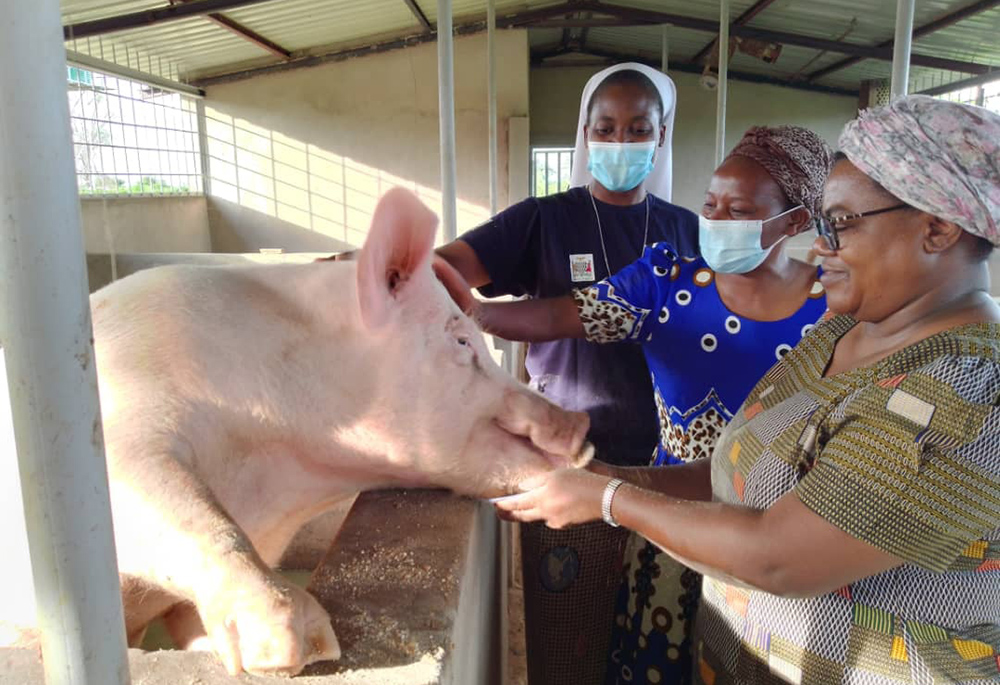
Sr. Christabel Juunza Mwangani, left, a Religious Sister of the Holy Spirit, based in the Diocese of Monze, in Zambia, tends to a pig with Sr. Christerbel Mwaaba, center, and superior general Sr. Rosalia Sakayombo, right. Mwangani was one of three Catholic sisters recognized with a Builders of Africa's Future award in 2022. (Courtesy of Christabel Juunza Mwangani)
The Emerging Farmers Initiative has now grown into a promising agribusiness. In 2023, we have targets to produce annually 12,000 chickens for meat; 5,000 trays of eggs, 3000 kilograms (about 6,614 pounds) of fish, 13,500 kilograms (about 29,762 pounds) of pork, and a variety of vegetables and fruits annually. In 2023, the Emerging Farmers Initiative will start formulating and producing its own stock feeds, while encouraging young people to replicate all that in their own communities.
As a way of keeping in mind the messages of the Sisters Blended Value Project, the proceeds from the EFI are used to support vulnerable students who cannot afford school fees, as well as to support the needs of the sisters within the congregation.
With the support of the Conrad N. Hilton Foundation and the Africa Diaspora Network, I was enrolled for a training with the African Management Institute in April to June 2022. This training was just what I needed to gain ground into entrepreneurship. It sharpened my understanding and appreciation of the importance of record keeping in an enterprise. To date, I am keeping various records for all the activities in the Emerging Farmers Initiative.
I learned how to analyze the finances in the enterprise, so that even while I was still undergoing the training, I began to notice where the losses were coming from, which streams brought the highest revenue, and which ones had greater potential for scaling up. I began to understand the relationship that exists among stock kept in the enterprise, the cash position, revenue, and finally the profit or loss.
Advertisement
Winning the Builders of Africa's Future Award for 2022 was best experience ever! I felt so happy to be a participant in the fight against poverty in Africa, and in being a beacon of hope for the future of my continent. During my training, now as a Builder of Africa's Future, I was paired with a mentor, who helped me know how to approach various investors. This was very helpful because the mentor spoke from his experience of being an entrepreneur. I experienced a sense of fulfillment as a person, in that, while I was acting locally, the impact will eventually spread to the whole continent, and that remains my aim. I will continue working with the younger generation in order to influence the future more positively.
With the $25,000 that came with the BAF 2022 award, we have decided to expand the poultry project of the Emerging Farmers Initiative. This expansion will increase the production of chickens and eggs to meet the demand and to increase the revenue base of the enterprise. We intend to use it to construct a chicken run that will be used to house the chickens for meat production. This in turn will increase the production of eggs because we shall keep an increased number of layers from 500 to 1,000 at every given time.
We shall have revenue from the sale of both eggs and chickens. With the poultry house built, the youth we train will gain hands-on experience in rearing of chickens for meat and for egg production. The Emerging Farmers Initiative will directly impact 30 youths per year, from 30 different households, but the positive effect extends to about 320 individuals as these youth come from families/households with an average of 8 members. Additionally, our products are sold to boarding schools and households, but with this expansion, we shall sign contracts with the local supermarkets too. This will increase the impact to over 5,000 people in the next two years.
All this activity in the life of the Religious Sisters of the Holy Spirit has brought a complete shift from total dependence on donor aid to a focus on utilization of the local and available resources for self-sustainability of the congregation. I am very passionate about social entrepreneurship projects because I am convinced that it is one sure way of improving and sustaining a congregation and contributing to the local community. I am profoundly happy to be a part of this paradigm shift.
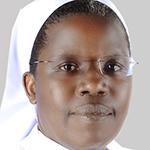
Sr. Rose Thumitho is a member of the Little Sisters of St. Francis. With a graduate background in public administration/management, she worked in hospital administration for 15 years. With her social work and entrepreneurial skills, she has been a champion in community mobilization, especially as a social entrepreneur in the agribusiness sector, and advocates for the environment while promoting good health for humanity through organic farming and ecosystem management. She is co-founder and business/development manager of Mother Kevin Providence Social Enterprise.
Through two programs, I have had the opportunity to learn and improve entrepreneurship, business and management skills to enable me to help my congregation and some members of our local community near Jinja in eastern Uganda. The training also helped me to be named among three Catholic sisters who were among 11 entrepreneurs recognized in 2022 as "Builders of Africa's Future."
My introduction to these concepts was through my participation in the Sisters Blended Value Project, created by Association of Congregations of Consecrated Women in Eastern and Central Africa, or ACWECA, and the Miller Center for Entrepreneurship at Santa Clara University and supported by the Conrad N. Hilton Foundation's Catholic Sisters Initiative. The purpose is to help sisters acquire skills in "startup" and management activities that generate income to sustain their ministries of evangelization and to help their local communities. I had some familiarity with the program in its early phases, having heard about it through ACWECA in 2018.
My congregation's Franciscan charism (Little Sisters of St. Francis) to serve the poor, particularly women and youth, led us to dream of teaching those in our local community the skills to become economically sustainable families. The Miller Center training program was a perfect opportunity to begin to fulfill this dream.
Three sisters of our congregation — co-founders of the Mother Kevin Providence Social Enterprise — Srs. Mary Florence Anaso, Mary Atema, and I — decided initially to learn poultry management. This involved the selection of poultry, housing, nutrition, disease identification and administration of medications, marketing techniques, record and data keeping, and finance management.
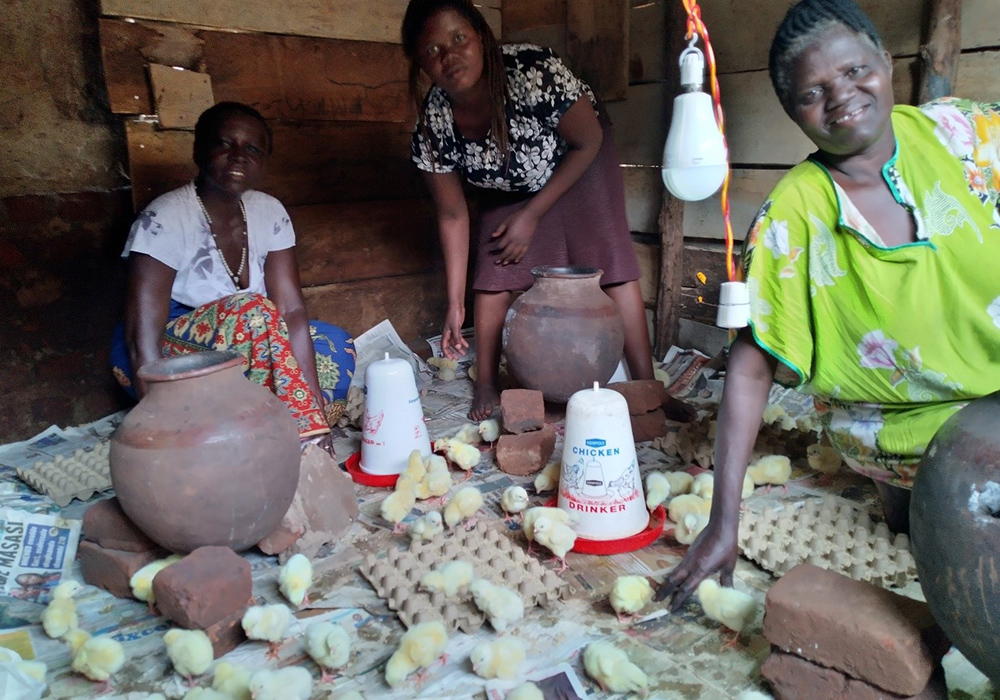
A women's group, after being empowered by the Little Sisters of St. Francis, start a joint poultry project. Sr. Rose Thumitho completed social entrepreneurship and business training through the Sisters Blended Value Project and the African Diaspora Network and has worked to convey those skills to women and young adults in the local community to boost their agricultural enterprises. (Courtesy of Sr. Rose Thumitho)
When the other two sisters and I joined the Sisters Blended Value Project in late 2019, we were among the second cohort to start understanding the concept of transforming charity activities and resources into entrepreneurship. As sisters, we didn't know entrepreneurship or social enterprises and that's where the Miller Center helped us. The program included an introduction to a local entrepreneur who had a successful poultry venture called Eggpreneur. The training had to continue online once COVID-19 hit in March 2020. Still, we learned about poultry management, how to present a business plan and how to make a 10-minute pitch.
At the end of that program, we were introduced to a second level of learning in a so-called "accelerator" program, conducted mostly via Zoom because of the pandemic. Staff and students from the Miller Center served as mentors, and we deepened our understanding of social entrepreneurship and skills such as digital storytelling. By January 2021, that training was completed.
Amid the training, we began our poultry project. Besides our lack of skills and knowledge, the biggest challenge was that our infrastructure for agriculture development was inadequate. We had little or no capital for startup, to say nothing of scaling up to expand our projects. We lacked adequate storage spaces and we did not have any experience in transporting our products to markets. Marketing and advertising our products were entirely new to us. We were also aware of climate changes that affect our farming ventures: Drought has decreased the availability of feed and increased the price.
We started with five chickens in 2019 and started growing with capital from some donors. Then we were able to start increasing up to 200, then 500, then 1,000 birds. Our peak was having around 2,000 birds. We started making profits which we put back into investing and growing.
We established strong networks with hotels and restaurants. But then COVID-19 presented severe challenges. The customers could not buy because tourists could not come. We had nowhere to sell our product. We lost money and are still in the stage of recovering.
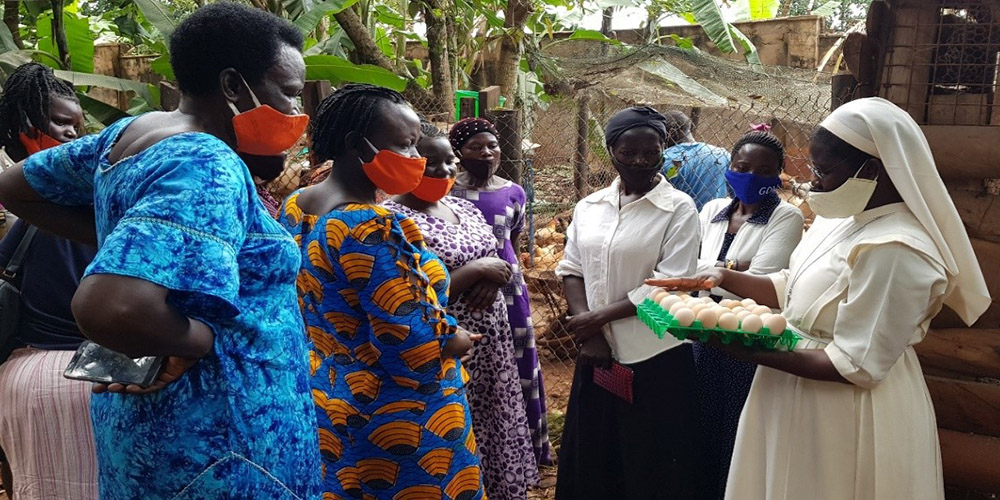
Sr. Rose Thumitho teaches women how to arrange eggs. (Courtesy of Sr. Rose Thumitho)
Even so, the Miller Center training and the connection with Santa Clara University students as mentors and volunteers was very worthwhile. It was a contributing factor to the next stage of my training.
In 2021, ACWECA and the African Diaspora Network, together with the Hilton Foundation, invited 10 congregations to send a member to learn business and social entrepreneurship. Asked by my superior, I joined the other nine sisters in a program with the African Management Institute to deepen our knowledge in these areas and enable us to teach skills to others in our congregations and local communities.
From that program, I was selected among three sisters as "2022 Builders of Africa’s Future" by the Africa Diaspora Network. The designation for 11 entrepreneurs came with additional training and mentorship, and a chance to be awarded a $25,000 grant. We were empowered with skills in "resource mobilization" that included topics like project writing and pitch making to help us search for grants for capital and seed loans for our target groups.
These were my favorite parts of the program, along with counseling, digital storytelling, networking, marketing, and venturing into new ideas — especially the online studies through Zoom. I also loved learning communication skills so that I can communicate accurate information to others, engage in conflict resolution, and learn new skills in how to grow our enterprise and increase investments.
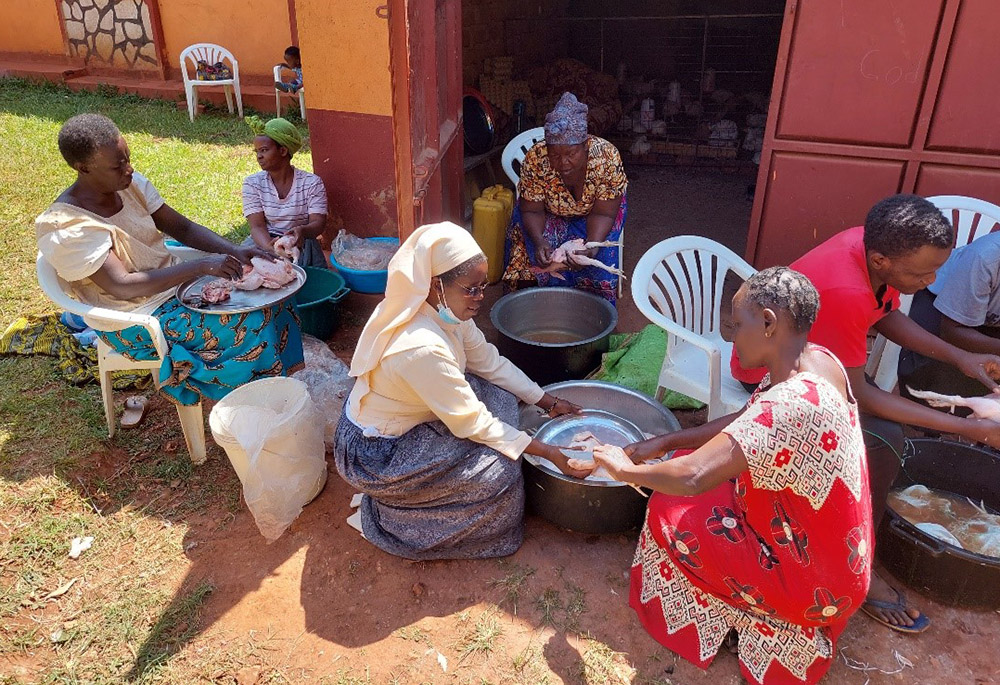
Sr. Rose Thumitho and members of the local community involved in the project help prepare chickens to be delivered to markets for sale. (Courtesy of Sr. Rose Thumitho)
Because of COVID-19, we could not go to the U.S. to present our pitches, but we successfully presented through Zoom in June. The $25,000 award (from the U.S. African Development Foundation) upon completing the program will help us with recovering from the "post-COVID effect." With the award, we plan to establish an irrigation and solar pump for horticulture, buy a hatchery machine and construct a shelter to house it, and train a group of vulnerable women and young people with skills in organic farming. We also plan to buy a refrigerator, a laptop computer and a phone. There is need for an additional $20,000 for us to achieve our goals.
All of this training has been of great benefit. The skills we have acquired have been a great help, and I am able to impart the skills to sisters, women in formation to become sisters, vulnerable women and young people in our community. Being recognized as change-makers gives us more influence.
Our main target group in the community are women and youth within the suburbs and villages surrounding Jinja City. We have engaged with about 25 families and have a target group of 100. We have expanded to animal husbandry, fruit drying, mushroom growing, and organic horticulture (particularly maize, of which we have five acres) to produce nutritious and healthy products for consumption, and to help in promoting soil conservation. We have started on a small scale as we need additional capital to grow.
The training has enabled me to present ideas in a way that others can understand, and allowed us to get the award of $25,000. It has enabled me to make a fundable pitch and the knowledge of how to capture the data and manage our accounts very well.
Thinking about the future, I realize I still need more training in building capital, scaling initiatives, and resource mobilization to make our projects sustainable in the face of so many unforeseen circumstances. I would also like more exposure to global communities and business networks for marketing. With the shortage of food worldwide, I am convinced of the need for more people to be trained in agribusiness so families and sisters can feed themselves, provide a food surplus for the market and generate income. My heartfelt gratitude to all who have helped me be the best I could be to meet our goals.
